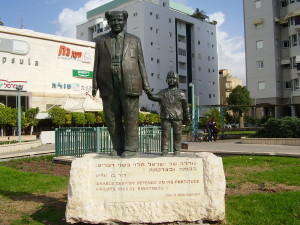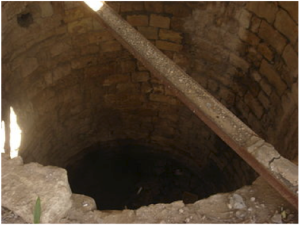David Ben-Gurion: Abraham the Father of the Hebrew Nation
Matia Kam
The topic of David Ben-Gurion’s lecture at the 10th TANACH Conference was Abraham, the father of the nation, the father of the faithful, and the one who loved God. In his lecture Ben-Gurion emphasized that, “it was natural in an independent Israel that young Jews would feel closer to the time of TANACH than to a shtetel in the diaspora.” Ben-Gurion explored the relationship between the state and the diaspora in terms of a relationship to TANACH, more meaningful in life on the land, and more specifically a strong connection to the life of Abraham, the father of the nation.

Inscription: Israel’s destiny depends on its fortitude and its moral rightness. (David Ben-Gurion)
Photographer: Dr. Avishai Teicher
Hebrew Wikipedia
In exploring the relationship of land and diaspora, Ben-Gurion saw the link to Abraham’s life, and emphasized that diaspora “is not a post TANACH phenomenon.” The first diasporic experience was already mentioned in Genesis, as God spoke to Abraham in the Covenant Between the Parts. In fact, he noted, the diaspora preceded “the birth of the nation and its settling on the land,” since Abraham’s origins were not in the land, but in Ur Kadim and Haran in what is today, Iraq and Turkey.
Ben-Gurion proposed that Abraham was drawn to leave Haran and go to Canaan because it had already exhibited budding ideas of a single God and can be seen in Malki Tzedek, the king of Shalem who expressed such a belief (Genesis 14). Abraham first destination, Shechem, was not accidental, because “it housed, since ancient times, God’s sanctuary” [Joshua 24:26] it was there in Shechem that God promised to give the land to Abraham and to his descendants.
Ben-Gurion reminded his audience that the Jewish nation was “the first among nations to write its own history books” and more than just historiography, its significant is rooted in its religious
aspect, the emphasis on faith that permeates and characterizes the stories in the books.” He emphasized that the religious/faith thread in the story of Abraham is not just about the father of the Hebrew nation, but underscores the essence of the Hebrew nation from its inspection to our time.
Thus, Ben-Gurion saw a connection between the life story of Abraham and the history of the nation, the belief in one God, Creator of the Universe, the promised land a covenant, the settlement in the promised land, the return, the exile and its suffering.
Key evens in Abraham life were reflected in life in the state of Israel. These included dividing the land (between Abraham and his nephew Lot), voluntarism, redeeming war prisoners, and an ethic of justice and compassion that he feared was beginning to diminish in our time.
One of the most impressive deeds in Abraham’s life, is the his response to the idea that God would destroy Sodom and Gomorra, Abraham responds instantly and without hesitation that God would surely distinguish between those who transgressed and the innocent who did no wrong. He turns to God, “Surely you the Judge of the world, would not do injustice” [Genesis 18:20-25]. “Abraham’s sense of justice, his courage to argue with God, his Creator, is one of the most momentous acts in TANACH. It is, I think the only example when a human being demands with fortitude that his God acts with justice. Abraham’s courageous position as he insisted that God’s dealing with justice and compassion not just for fifty or ten righteous people, but pleading for the whole city of Sodom with its virtuous. Abraham did not hesitate to plead again and again and has done it in five different versions.” Abraham, Ben-Gurion noted, was recognized in Isaiah as the one who loved God [Isaiah 45:8] and indeed the only one in TANACH who was honored and referred to as the one who loves God ???? ??????

Hebrew Wikipedia